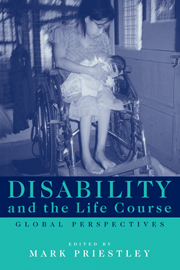Book contents
- Frontmatter
- Contents
- List of figures
- List of tables
- Notes on contributors
- Preface
- Acknowledgements
- A brief note on terminology
- I Concepts
- 1 Introduction: the global context of disability
- 2 Repositioning disability and the life course: a social claiming perspective
- 3 Marginalisation and disability: experiences from the Third World
- 4 Where do we draw the line?: surviving eugenics in a technological world
- 5 A complicated struggle: disability, survival and social change in the majority world
- II Methods and stories
- III The politics of transition
- Index
3 - Marginalisation and disability: experiences from the Third World
Published online by Cambridge University Press: 30 September 2009
- Frontmatter
- Contents
- List of figures
- List of tables
- Notes on contributors
- Preface
- Acknowledgements
- A brief note on terminology
- I Concepts
- 1 Introduction: the global context of disability
- 2 Repositioning disability and the life course: a social claiming perspective
- 3 Marginalisation and disability: experiences from the Third World
- 4 Where do we draw the line?: surviving eugenics in a technological world
- 5 A complicated struggle: disability, survival and social change in the majority world
- II Methods and stories
- III The politics of transition
- Index
Summary
Destiny, Fate, God, past sins … Call it whatever you will … It is not justified … It would have been better if I'd been allowed to die one day instead of dying everyday.
(Lakshmi)This is the voice of a 21-year-old disabled woman living in an urban slum in Delhi, the capital of India. Such voices are more the rule than the exception in my country, where I am existentially located as both an academician and a woman with visible physical impairment. From my vantage point, I have shared the dominant Hindu conceptions but, given the diversity of India, I wish to exercise a note of caution for the reader. Although I outline a common thread in my narrative, one must not discount the discrepancies.
India is perceived as the emerging superpower of the Third World, within the paradigm of globalisation and liberalisation. Globalisation has constructed a world that offers open-ended possibilities and new life patterns, like access to information and technology. However, the paradox is that its emphasis on power and profit has systematically dislodged vulnerable groups from access to even basic resources such as food and livelihood. Consequently this transformation of society has a very different meaning for people who have been oppressed because of their gender, class, race, religion, caste, displacement and disability status.
As disability cuts across all categories, it has been suggested that it is a global issue, thus implying that its meaning and nuances are universal.
- Type
- Chapter
- Information
- Disability and the Life CourseGlobal Perspectives, pp. 26 - 37Publisher: Cambridge University PressPrint publication year: 2001
- 32
- Cited by



